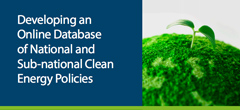6 June 2014—New Report Released
 The Clean Energy Solutions Center has released a new report, Developing an Online Database of National and Sub-national Clean Energy Policies, which was designed to support countries interested in creating a centralized online database to improve access to clean energy policy information.
The Clean Energy Solutions Center has released a new report, Developing an Online Database of National and Sub-national Clean Energy Policies, which was designed to support countries interested in creating a centralized online database to improve access to clean energy policy information.
1 October 2013—New Policy Database for India Announced
India’s union and state governments have established a policy environment to support investment in energy efficiency and renewable energy technologies throughout the country. To disseminate the renewable energy and energy efficiency policies, regulations and incentive programs for the benefit of project developers, businesses, and consumers, the U.S. Department of Energy and India’s Ministry of New and Renewable Energy, in collaboration under the U.S.-India Energy Dialogue and the Clean Energy Solution Center, developed an online database that provides succinct summaries in a clear and simple format. Learn more.
Countries all over the world are establishing multiple policies to support investment in energy efficiency and renewable energy technologies. In many countries, there are central government policies that apply across the country and there are also subnational government policies that apply only to projects located in the jurisdiction of the subnational government. Subnational policies, for example, are those developed by regional, state, provincial, and local governments. Clean energy developers, consumers, businesses, and policymakers alike can find it difficult to navigate the unique policy situations that exist in different localities. Understanding all of the policies that apply to unique projects is further complicated because it can often be difficult to find information on policy details.
One way to address this market barrier is to establish a single, online repository that provides the public with summary information on all clean energy policies and access to the documents that describe the policies in detail. The premier example of such a database is the Database of State Incentives for Renewables and Efficiency (DSIRE), which is funded by the U.S. Department of Energy (DOE). When established in 1995, DSIRE tracked about 200 federal, state, and local government policies. The online public database has grown to track more than 2,700 policies and averages as much as 600,000 visits and 200,000 unique visitors to the site each month.
The U.S. Department of Energy and India’s Ministry of New and Renewable Energy have partnered together under the Clean Energy Ministerial and the U.S.-India Energy Dialogue to develop the Indian Renewable Energy and Energy Efficiency Policy Database (IREEED). The beta version of IREEED was released in April 2013 at the Fourth Clean Energy Ministerial. The online public database will include summaries of all clean energy policies established by the central and state governments in India.
Recognizing that other countries may be interested in developing their own clean energy policy databases, the training materials developed to support the team building IREEED will be available through the Solutions Center shortly.
